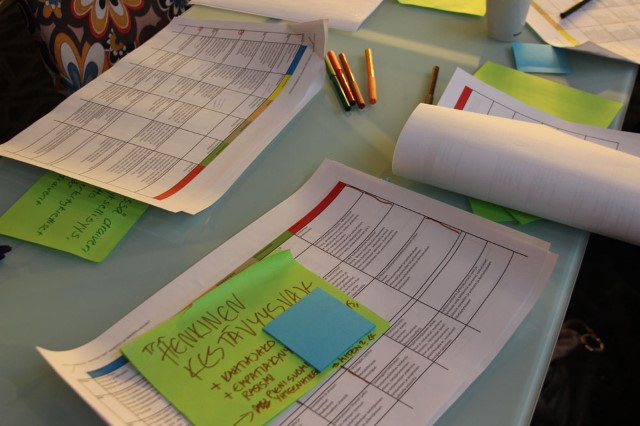The Forum for New Education continued its work through a series of seminars held between 20 and 22 January 2015. The forum was set up in December 2014 and comprises 31 people from different walks of life. The aim of the seminars was to continue identifying challenges relating to education, and to brainstorm ideas for a future vision of the Finnish education system.
The seminars presented an opportunity to focus on key current phenomena related to new education. The participants heard several presentations and had the chance to consult experts, review the past and ponder the future of the education system and, most importantly, consider where we are heading next.
Social challenges, such as the transformation of working life, digitisation, growing inequality and multiculturalism, and globalisation are also affecting the sector. The key questions and challenges had already been identified during the forum’s orientation day in December: what basic competences, knowledge and skills should education provide for everyone in our ever-changing world? What metaskills and know-how will people need in the Information Age? How can learning be bound seamlessly to all stages of human life?
The concept of a learner-centred approach also sparked much debate during the seminars: could schools become schools without boundaries, and could learning and teaching happen regardless of age, time and place, wherever and whenever? How can we get learners to be more involved and active in their own learning? How can we turn diversity among learners into an asset?
The seminar participants also debated the financing and regional equality of education and brainstormed on how Finland could become a global development platform for new education in a way that would galvanise Finnish society and education exports.
Before deciding how to deal with the societal challenges confronting the education sector, we need to set our sights far into the future. What will the world look like once these challenges have been overcome?
The seminar participants identified seven thematic scenarios for the future of education. These are not the forum’s final conclusions, but are intended for use as visions and tools for the forum’s future work.
Once the aforementioned challenges have been overcome, we will have the following.
- An innovative, boundary-breaking, flexible education system, where learning takes place in interactive networks regardless of age and time. Flexible and contemporary learning paths will allow skills to develop in line with our changing world. The education system will be a key contributor to change and to building a better future.
- A system built around the learner. Learning will be seen and education services designed from the learner’s perspective. Learners will be accountable for their own learning, while the role of tutors will be to provide support and encouragement.
- Regional equality. Access to learning will not depend on the learner’s place of residence. Schools will be able to recognise skills that stem from people’s living environments. Schools will be at the core of their communities, removing barriers between people.
- An education system fit for the Information Age. Finland will be a global trendsetter in the development and application of learning-related technology. Finnish teachers and learners will be the first to adopt new technological solutions and use them enthusiastically. Technological and non-technological solutions will support each other seamlessly.
- A country that is a pioneer in learning. Finland will be known for its modern and adaptable learning environments and pedagogical models. Finns will be active partners and learners in global education networks. Finland will engage in open international dialogue and become a sought-after partner in education development projects.
- A country that is the world leader in education management. Finland will have adopted a bold leadership culture that encourages risk-taking. Instead of competition and autonomy, the focus will have shifted to teamwork where best practices are shared seamlessly and openly.
- The related financing problems will have been solved. Existing resources will have been pooled and redistributed effectively. Far-sighted core financing and project funding will have been focused solely on experiments, profitable investments and measures aimed at embedding and sharing best practices. The teaching profession will be governed by flexible collective agreements and a system of annual working hours.
The original target year for the vision was 2040, but as the participants entered deeper into their discussions, they found the idea of target years restrictive and perhaps even likely to slow progress towards achieving their goals. For this reason, the target year has been left undecided for now.
As stated above, the aforementioned scenarios are not the forum’s final proposals, but are intended to spark further debate. Wherever possible, the forum will continue to factor in new comments and ideas. The Facebook page of the Forum for New Education has already grown into an important brainstorming platform – all comments on the topic are very welcome there. The work continues!



Recommended